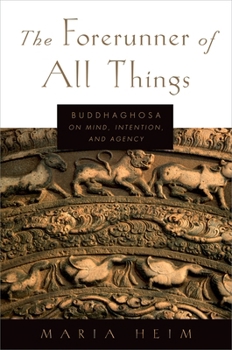The Forerunner of All Things: Buddhaghosa on Mind, Intention, and Agency
Scholars have long been intrigued by the Buddha's defining action (karma) as intention. This book explores systematically how intention and agency were interpreted in all genres of early Theravada thought. It offers a philosophical exploration of intention and motivation as they are investigated in Buddhist moral psychology. At stake is how we understand karma, the nature of moral experience, and the possibilities for freedom. In contrast to many studies that assimilate Buddhist moral thinking to Western theories of ethics, the book attends to distinctively Buddhist ways of systematizing and theorizing their own categories. Arguing that meaning is a product of the explanatory systems used to explore it, the book pays particular attention to genre and to the 5th-century commentator Buddhaghosa's guidance on how to read Buddhist texts. The book treats all branches of the Pali canon (the Tipitaka, that is, the Suttas, the Abhidhamma, and the Vinaya), as well as narrative sources (the Dhammapada and the Jataka commentaries). In this sense it offers a comprehensive treatment of intention in the canonical Theravada sources. But the book goes further than this by focusing explicitly on the body of commentarial thought represented by Buddhaghosa. His work is at the center of the book's investigations, both insofar as he offers interpretative strategies for reading canonical texts, but also as he advances particular understandings of agency and moral psychology. The book offers the first book-length study devoted to Buddhaghosa's thought on ethics
Format:Paperback
Language:English
ISBN:0199331049
ISBN13:9780199331048
Release Date:October 2013
Publisher:Oxford University Press
Length:272 Pages
Weight:0.80 lbs.
Dimensions:0.8" x 6.1" x 9.1"
Customer Reviews
0 rating





